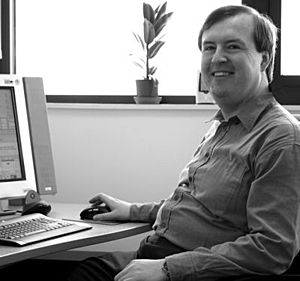David T. Jones (biochemist) facts for kids
Quick facts for kids
David Jones
|
|
|---|---|

David Jones in 2006
|
|
| Born |
David Tudor Jones
November 1966 (age 59) |
| Nationality | British |
| Alma mater |
|
| Known for | Protein Fold Recognition Protein Structure Prediction |
| Awards | Royal Society University Research Fellowship (1995–1999) |
| Scientific career | |
| Fields | |
| Institutions | University College London Birkbeck, University of London |
| Thesis | Structural approaches to protein sequence analysis (1993) |
| Doctoral advisor |
|
David Tudor Jones (born in 1966) is a British scientist who studies Bioinformatics. He is a professor at University College London (UCL) and leads the Bioinformatics Group there. He also helps run the Bloomsbury Center for Bioinformatics, which is a partnership between UCL and Birkbeck, University of London. This center helps scientists learn about and use bioinformatics in their research.
Contents
Learning and Degrees
David Jones studied at Imperial College London where he earned a degree in Physics. He then went to King's College London to get a master's degree in Biochemistry. After that, he attended University College London and completed his PhD in 1993. His research there was guided by William R. Taylor and Janet Thornton.
Research and Discoveries
Professor Jones's main research focuses on understanding and predicting the shapes of proteins. He also studies how proteins fold, how they cross cell membranes, and how to use machine learning in biology. He has worked with companies like GlaxoSmithKline. In 1998, he helped start a company called Inpharmatica Limited. This company used computer science and chemistry to find new medicines by studying how proteins and chemicals interact.
THREADER: Predicting Protein Shapes
THREADER is a special computer method that helps predict the shape of a protein. It's like trying to find the best-fitting puzzle piece for a protein sequence. If a protein's shape isn't known, THREADER compares its sequence to proteins with known shapes. It then suggests the most likely shape for the unknown protein. This method helps scientists understand how proteins work.
MEMSAT: Understanding Cell Membranes
MEMSAT is a computer program that predicts where parts of a protein might cross a cell's membrane. Cell membranes are like the skin of a cell. This program uses information from many known membrane proteins to make its predictions. The newest version, MEMSAT3, came out in 2007. It uses a type of artificial intelligence called a neural network to figure out which parts of a protein are inside the cell or crossing the membrane.
CATH Database: Organizing Protein Structures
David Jones helped create the CATH database with Christine Orengo and Janet Thornton. This database is like a giant library that organizes all the known protein structures. It sorts proteins into different levels based on their shape and how they are built. This helps scientists easily find and compare different protein structures.
GenTHREADER: A Faster Protein Predictor
GenTHREADER is an improved and faster tool for predicting protein shapes. It can look at a whole protein or just parts of it. This tool first lines up protein sequences and then uses special techniques to check how well they fit together. Finally, it uses a neural network to decide how confident it is in its prediction. GenTHREADER has led to many new and better prediction methods.
PSIPRED: A Hub for Protein Predictions
PSIPRED is an online service that brings together several protein prediction methods. It includes PSIPRED (which predicts the basic structure of proteins), MEMSAT3 (for membrane proteins), and GenTHREADER (for protein shapes). Scientists can submit a protein sequence to this website, choose which prediction they want, and get the results by email.
Awards and Recognition
From 1995 to 1999, David Jones held a special Royal Society University Research Fellowship. In 2022, he was chosen as a Fellow of the International Society for Computational Biology. In 2023, he became a Fellow of the Royal Society, which is a very high honor for scientists in the UK.
 | Aurelia Browder |
 | Nannie Helen Burroughs |
 | Michelle Alexander |

